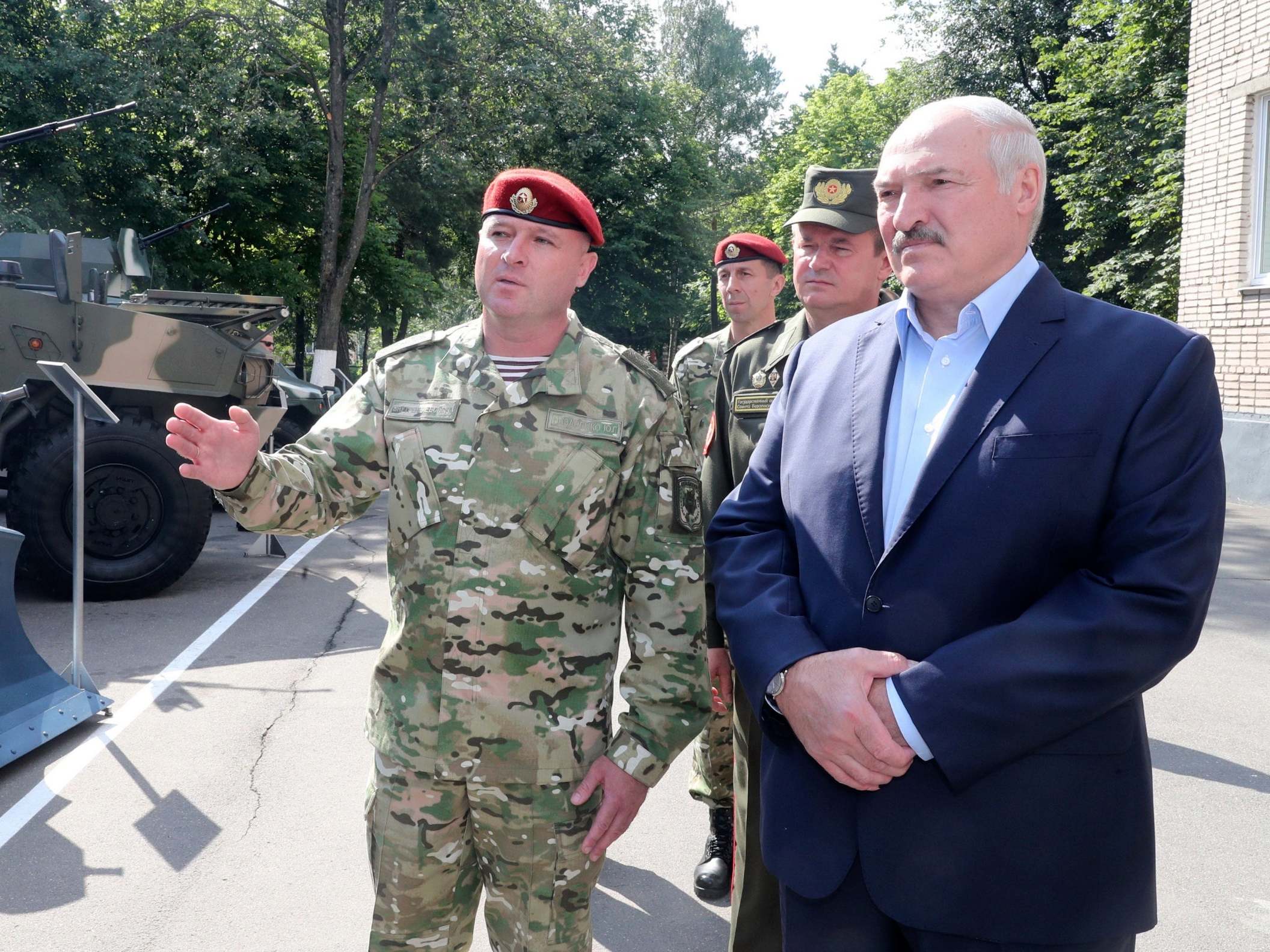Belarus charges opposition politicians with assisting Russian mercenaries in ‘terror’ plot
This follows wild allegations of a revolutionary plot by Russian mercenaries, explains Oliver Carroll


Ten days before the increasingly dramatic presidential elections, Belarus state media broke the wildest of stories.
A Russian mercenary force had been caught in Minsk plotting to disrupt the vote. The 33 men, said to be from the private Russian military firm Wagner, had disguised themselves as tourists at a sanatorium, but had given themselves away by their military clothing and “not drinking”.
Video footage broadcast on Wednesday of a dawn raid saw Belarusian KGB officers seize the soldiers and their motley collection of personal effects that included military insignia, dog tags, Arabic texts, Sudanese banknotes, SIM cards, and condoms.
On Thursday, by charging two opposition politicians alongside the Russian mercenaries, Belarusian authorities seemed to offer clues about the real nature of the operation.
A statement by the State Investigative Committee charged former presidential candidate Mikola Statkevich, banned presidential candidate Sergei Tikhanovski, and unnamed others with helping to plot mass unrest against the rule of the country’s self-styled dictator Alexander Lukashenko.
It was not immediately clear how the men could have coordinated such actions given that they are both in KGB jails.
Earlier in the day, presidential candidates were summoned to a briefing. There, it is reported security chief Andrei Ravkov told the candidates new “security measures” could be introduced, right up to the point of shutting down the internet.
According to the candidate Andrei Dmitriyev, Mr Ravkov said another 170 Russian fighters are stationed in the country, with more poised to join from camps across the border. Trained as snipers and explosive experts, the mercenaries supposedly presented “a particular risk” to public rallies, Mr Ravkov is reported as saying.
Critical voices within Belarus believe this claim was targeted against unified opposition candidate Svetlana Tikhanovskaya, who is leading an unexpectedly strong unified opposition challenge to Mr Lukashenko. She is the only candidate regularly attracting tens of thousands of supporters in mass rallies.
Indeed, thousands of Ms Tikhanovskaya’s supporters gathered on Thursday at her campaign rally in Minsk, where many participants dismissed the official claims of a Russian subversion plot as a sham.
“We are worried about the lack of money to buy food and medicines, not some mythical enemies and plots,” retiree Nikolai Ostapchuk, 72, said.
Andrei Strizhak, an activist who led a grassroots campaign during Belarus’s coronavirus epidemic, said the Wagner emergency had all the hallmarks of being manufactured. It was not the first time the state had used bizarre events to manipulate public opinion around the time of elections or public disorder, he suggested.
On the eve of the 2006 elections, for example, security services announced opposition forces were preparing to contaminate water supplies with dead rats.
Many elements of the Belarusian claims about Wagner do seem suspicious. On a very basic level, 33 soldiers gathering together in military uniforms does not appear to be the most obvious way to start an undercover revolution.
One Russian war correspondent suggested the fighters were in Minsk because they were using Belarus as a transit base on the way to an operation in Sudan. Russia’s borders remain closed due to Covid-19 restrictions. The evidence of Sudanese SIM cards and cash would certainly support such an explanation.
Caterina Andreeva, a local journalist who has co-authored a book on Belarusian links to mercenaries in the Ukrainian conflict, said the appearance of Wagner fighters in Minsk was no surprise to authorities. Private guns had lived and rested in Belarus in between stints in the Donbass and Syria “for years”, she claimed – and without any problems.
“Ukrainian security services have made constant requests to get them extradited, with zero response from Minsk,” she said.
What is more, at least one of the men arrested on Wednesday appears to be a long-time Belarus resident, returning to Minsk after the battle of Debaltseve, Ukraine, in February 2015.
The Kremlin has responded to the Belarusian claims by saying it does not know what the men are being accused of.
“We hope that we will get complete information about what illegal activity they are supposed to have done,” spokesman Dmitry Peskov said – before adding Moscow had “no information” about the operations of private military companies consistently and credibly linked to the Kremlin.
“In Russia, de jure, there is no such thing as a private military company.”
Join our commenting forum
Join thought-provoking conversations, follow other Independent readers and see their replies
Comments